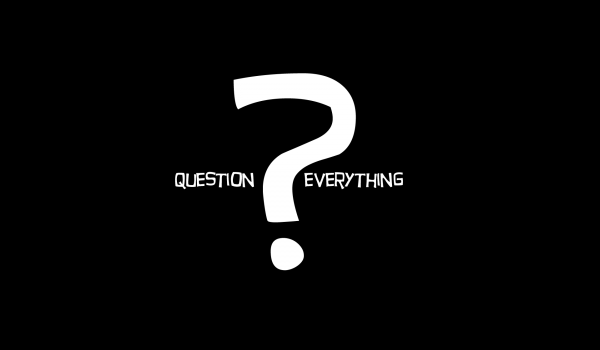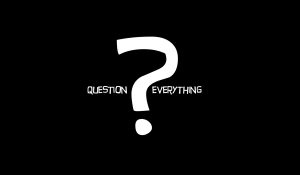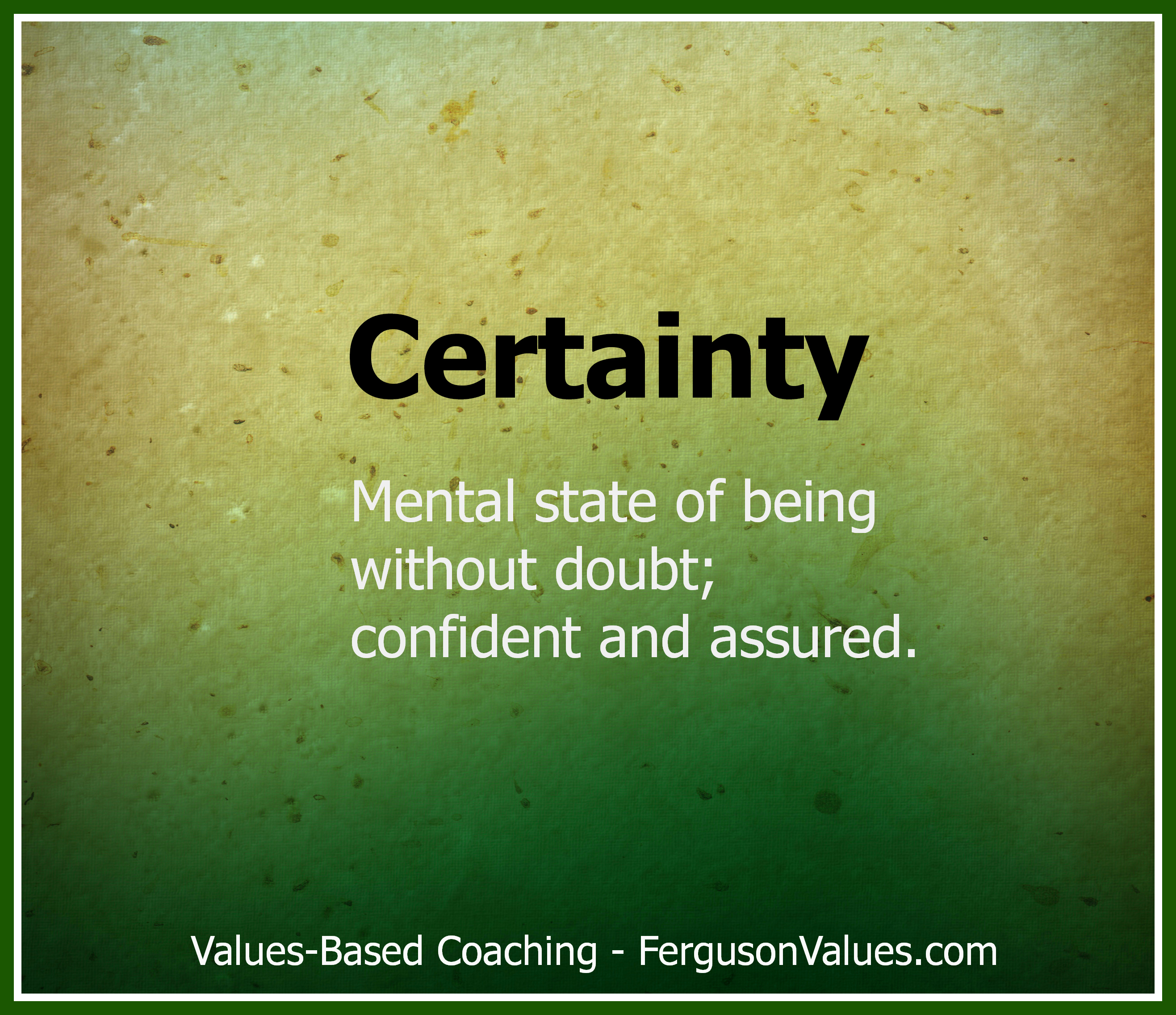A healthy dose of skepticism is a good trait to possess. This helps us to discern fact from fiction and keeps us from being someone’s pawn. The Bible shows that discernment is necessary. John writes that one should “test the spirits to see whether they are from God, for many false prophets have gone out into the world” (1 John 4:1, ESV). Therefore, one should not trust everything that comes along life’s way. However, when one becomes overly skeptical, it is easy for one to become just as easily duped. In fact, it may be said that extreme skepticism (henceforth termed “hyper-skepticism”) can lead one to a point that nothing can be accepted.
Hyper-skepticism is a growing problem. In fact, I recently conversed with an individual on the issue of hyper-skepticism. Throughout our conversation, I discovered three enormous problems with hyper skepticism.
Problem 1. Hyper-skepticism leads to a lack of trust in experience.
The first problem that comes from hyper-skepticism is a lack of trust in experience. In fact, the conversation I held with the individual began in this realm. The antagonist did not believe that one could believe in religious experiences. However, I provided data that corresponds not just with one person’s experience, but the experience of countless others. For example, one cannot deny the incredible testimonies of Muslims who have had experiences with Christ which have led them to convert to Christianity despite the threat of execution. This was not good enough for the skeptic. This led me to ask how one could trust their experience in anything. Surprisingly, the antagonist agreed. This leads to further problems which will be dealt with in a moment.
When skepticism gets to the point that one’s experiences cannot be trusted, then how can one learn anything about life and reality? The experiences of life mold one to become a better person. I would argue that one of God’s greatest teachers in life is that of experience. Solomon wisely writes that “Whoever loves discipline loves knowledge, but he who hates reproof is stupid” (Proverbs 12:1, NASB). Life provides such reproof, or correction. Solomon rightly states “As a dog returns to its vomit, so fools repeat their folly” (Proverbs 26:11, NIV). This is the problem with hyper-skepticism. If one’s experiences cannot be trusted, then how does one ever learn? Furthermore, it would seem that the lack of trust in religious experiences stems more from an anti-theological bias rather than intellectualism. How intellectual would it for the skeptic to resist God’s extension of grace towards the skeptic? In such a case, hyper-skepticism has little to do with intellectualism and more to do with a heart of rebellion.
Problem 2. Hyper-skepticism leads to a lack of trust in empirical data.
The second problem of hyper-skepticism emerges from the first. If experiences cannot be trusted, then how can empirical data be trusted? Wait Pastor Brian!!! Empirical data is outside of one’s senses, isn’t it? Then how does this relate to one’s sensual experiences? Consider this: one must use their senses to evaluate empirical data. As you are reading this article, you are evoking at least one of your senses: sight. Therefore, you are reading the empirical data (the words) by your sensual experience (sight). The same is true for the scientific method. When a scientist evaluates a claim, she may write down particular formulae. This uses sight and touch. She will then test her theory. The testing may include a wide variety of senses (sight, touch, hearing, smell, and perhaps tasting). Therefore, if one cannot trust one’s experiences (sensual data), then empirical data is out of reach. The scientific method collapses from hyper-skepticism.
The apostle Thomas has been dubbed with the title “Doubting Thomas.” This is due to Thomas’ claim that he would not believe in Jesus’ resurrection unless he saw the risen Christ for himself. Jesus appeared to Thomas and said to him, “Put your finger here, and see my hands; and put out your hand, and place it into my side. Do not disbelieve, but believe” (John 20:27, ESV). Thomas responded by proclaiming “My Lord and my God” (John 20:28)! Thomas believed the data that was in front of him. In fact, Thomas was no longer a skeptic. Thomas was a believer. Thomas’ belief in the risen Jesus led him to eventually suffer martyrdom in Madras, India as identified by ancient testimony (see the article “Embarrassing Details Concerning the First Easter” here at pastorbrianchilton.wordpress.com for more information concerning Thomas’ martyrdom at http://pastorbrianchilton.wordpress.com/2014/04/18/top-5-embarrassing-details-concerning-the-first-easter/). What if Thomas had not believed his experience? Thomas certainly would not have suffered martyrdom. Thomas would have said to have been foolish in such a case.
The skeptic I debated conceded the point that nothing could be known with hyper-skepticism and made the claim that certain experiences can be trusted. But this opens up the gate to all experiences. If someone is sick, would they deny their symptoms and pretend like they were not sick? How foolish! The sick person would seek medical treatment due to the experiences they were having. Should one pick and choose what experiences in their daily life is valid and which ones are not? No one lives life like this unless one is on some form of hallucinogenic drug. But religious experiences are not based on hallucinogens as argued by the debater. Why deny religious experiences if there are good reasons for believing their authenticity? It is true that some who have claimed to have religious experiences had other motives behind their claim. Some skepticism is healthy; however, for the skeptic to devalue all religious experiences when those experiences are held by those who certainly do not meet the standard of schizophrenia, or subject to hallucinations, due to an anti-theological bias is absurd. It leads towards the hyper-skepticism that has been evaluated in this article.
Problem 3. Hyper-skepticism leads to a lack of knowledge in existence.
Finally, if one cannot trust one’s experiences or empirical data, then nothing is knowable. Even Rene Descartes “cognito ergo sum” (I think therefore I am) collapses with hyper-skepticism. How then can one even trust one’s existence? If nothing can be trusted, then not even one’s own existence is safe. Perhaps the person is just a delusion. Perhaps all existence is a delusion. Again, this leads to absurdity. Descartes’ point is that one can know one’s existence and that person’s existence lends itself to the ultimate existence of a Creator. However, with hyper-skepticism, such cannot be said. In fact, hyper-skepticism lends itself to nothingness. Yet, the conscious, thinking, observer clearly knows that “nothing” is “no-thing.” We do not live in a world of “no-things,” we live in a world of existent realities. Therefore, hyper-skepticism should be devalued and rejected wholeheartedly by any truth-seeker.
Conclusion
Luckily, things are knowable. Some certainties do exist. Norman Geisler in his book The Big Book of Christian Apologetics lists five certainties:
“Logical Certainty. Logical certainty is found largely in mathematics and pure logic…
Metaphysical Certainty. …For example, I know for certain that I exist. This is undeniably so, since I cannot deny my existence without existing to make the denial…
Moral Certainty. Moral certainty exists where the evidence is so great that the mind lacks any reason to veto the will to believe it is so…In legal terms, this is what is meant by ‘beyond all reasonable doubt.’…
Practical Certainty (High Probability). Practical certainty is not as strong as moral certainty. Persons claim to be ‘certain’ about things they believe have a high probability of truth…
Spiritual (Supernatural) Certainty. If we grant a theistic God’s existence, he could give supernatural assurance that something is true. Likewise, if God speaks directly to a person…, then that person could have a spiritual certainty that transcends other kinds of certainty, because it comes directly from God…” (Geisler 2012, 74).
There are indeed things that can be known with a great deal of certainty. Religious experiences allow for a certainty that God not only exists, but is actively involved in creation and in the lives of human beings. Unfortunately, the hyper-skeptic may never be able to experience such a certainty, or any certainty for that matter, while they hold to their unjustified hyper-skepticism.
Bibliography
All Scripture marked (ESV) comes from the English Standard Version. Wheaton: Crossway, 2001.
All Scripture marked (NASB) comes from the New American Standard Bible. La Habra: Lockman, 1995.
All Scripture marked (NIV) comes from the New International Version. Grand Rapids: Biblica, 2011.
Geisler, Norman. The Big Book of Christian Apologetics: An A to Z Guide. Grand Rapids: Baker, 2012.
© Pastor Brian Chilton. 2014.









